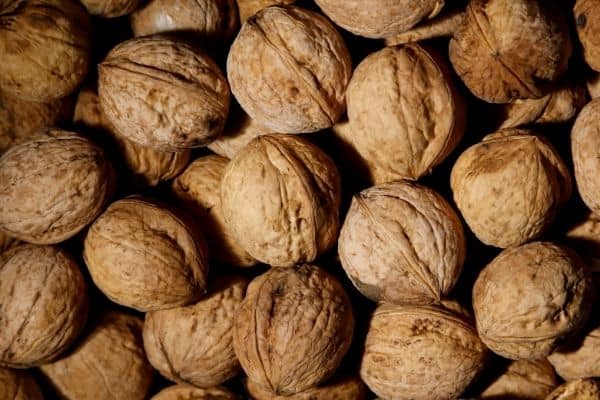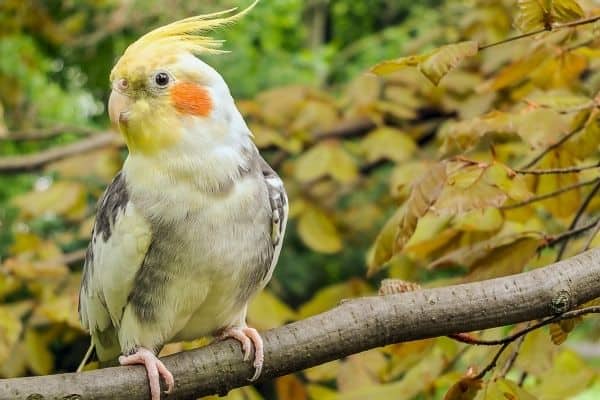Yes, cockatiels can indeed eat walnuts or other kinds of nuts. They are a healthy option in terms of snacks for your bird friend. Besides, they enjoy eating nuts not just for taste but for amusement too, as they peck on nuts for fun because of the texture. Walnuts are an excellent source of protein, trace minerals, and fats. Just make sure you don’t feed salted n seasoned walnuts.
Walnuts, like many other kinds of nuts, are healthy for both humans and birds alike. Let’s find out how.
How Safe Are Walnuts For Cockatiels
Walnuts are both safe and healthy for cockatiels. It merely depends on how you feed them for them to be beneficial or harmful. That is because walnuts are very rich in fats with about 65% and roughly 15% protein. Both the nutrients are essential for cockatiel’s diet, but excessive feeding can backfire.
As per the United States Department of Agriculture (USDA), one cup or 30g of walnuts comprise of the following:
- 200 calories of energy
- 3.89 grams Carbohydrates
- 2 grams Fiber
- 1 gram Sugar
- 20 grams Fat
- 5 grams Protein
- 20 mg Calcium
- 0 mg Sodium
- 0.72 g Iron
Besides the above nutrients, Walnuts are also an excellent source of the following
- Copper
- Manganese
- Phosphorous
- Magnesium
- Iron
- Vitamin B6
Walnuts also comprise Omega 3 Fatty acids and antioxidants, which are ideal for boosting immunity. Nuts may have high-fat content and calories, yet they are highly nutritious and offer healthy fats good for the heart. They help satiate the hunger for long because of the perfect blend of protein, healthy fats, and fiber. Thus, they make for the perfect treat as snacks and are a better option than chips, crackers, and other carbohydrate-rich foods for your cockatiel.
All the good things aside, it is still not advisable to feed your cockatiels too many walnuts. These nuts should not form a significant part of their meals.
Please note that the Phytate and Oxalate content level is relatively high in raw nuts s per PubMed. These elements can add to the deficiency of nutrients in your bird with minimized mineral absorption.
But there’s a way around it as well. You can soak the walnuts for some time before feeding. This process helps preserve the essential nutrients and activate good enzymes to absorb the nutrients better.
Walnut Serving Size For Cockatiels
Too many walnuts are not beneficial for cockatiels. A balanced diet is essential for cockatiels, like with all other birds and animals. Since they should eat walnuts as a snack, it should contribute to more than 10% of the diet.
The primary composition of their meals should be from pellets contributing to 60% of their diet. The other 30% should come from carrots, vegetables, and fruits such s raisins and grapes.
You may also like: Can cockatiels eat mint?
A balanced and healthy diet is pivotal for your cockatiel’s well-being. And that is why you should feed walnuts a maximum of two times a week. And you may also keep a variety when it comes to nuts. Besides walnuts, you can also treat them with peanuts, almonds, and many more.
Can Walnuts Be Risky For Cockatiels
Walnuts can also carry some risk factors for your cockatiels, even though they are nutritious snacks. Let us help you be aware of them to keep unwanted incidents at bay.
Salted and seasoned walnuts
The first component is salt. It can cause an imbalance in the fluid and electrolyte system in your bird’s health. Your cockatiel can also suffer from dehydration and kidney failure if the walnuts they eat have salt. The worst-case scenario could be death. And this is why you should pick walnuts that do not have salt or other added seasonings and artificial flavors as a precaution.
Avoid feeding nuts with shells.
The shells of walnut contain an element called Aflatoxin. This substance is toxic and can damage your cockatiel’s liver. Hence, always remove the shells first before giving walnuts to your pet cockatiel.
Molds on walnuts
Walnuts can gather molds if you store them in damp places. It leads to fungus growing on the nuts, which can prove to be very toxic for your pet bird.
Always store the walnuts in cool and dry places to prevent mold generation. As a thumb rule, avoid feeding walnuts to your bird which you wouldn’t eat yourself too.
Moderation is key
As stated earlier, walnuts are good as snacks adding to only 10% of their diet. And that’s why you should try not to feed large portions of walnuts to your cockatiel. Please don’t get carried away with the portion size as, unlike us, birds do not need as much.
Another tip is to crush the walnuts into tiny crumbs before feeding so that your little birdie can chew and swallow them at ease. This method is all then more helpful if your bird has just finished with the weaning process.
Do Cockatiels Love Walnuts

Most of the cockatiels end up liking what you feed them. It is also possible that your cockatiel may not develop a taste for walnuts.
Birds usually like walnuts because of their texture and enjoy snacking on them. But that doesn’t mean you’ll feed them as much s you want.
As we always say, moderation is critical and plays a significant role in keeping your bird fried healthy. Excessive feeding can do more harm than help to your cockatiel.
Other nuts that cockatiels can eat
Besides walnuts, there is a host of other nuts that your cockatiel would love to eat, in moderation, of course. They are,
- Beechnut
- Cashews
- Gumnut
- Macadamia
- Roasted peanuts without shells
- Pili nut
- Pistachios
- Roasted almonds without shells
- Brazil nut without shells
- Coconut
- Hazelnut
- Palm-nut
- Pecan
- Pine nut
Conclusion
The gist of everything we have read so far is, walnuts are highly nutritious as long as you take necessary precautions. Avoid salted, flavored, and seasoned walnuts. And since walnuts are exceptionally rich in fats, do not over-feed your cockatiels to avoid health hazards. Lastly, the shell is a complete no-no. So, always remove the shells before feeding walnuts to your cockatiel.
